ESSAYS
The creative partnership: Kabbalah’s guide for inspiration
5 July 2024 – Vol 2, Issue 3.
Every so often, I meet people who feel as if there is something ‘beyond’; as if there is a greater reality beyond what we typically see and understand. Can such a sentiment of a higher reality be useful as a source of inspiration to help people become more creative and imaginative? In this article, I will share the Jewish Kabbalah system which offers a model of creativity based on a sense of beyond. I will explain how the model provides tools that can benefit people in becoming more creative.
Psychologist Carl Jung argues (1972: 23) that when our senses react to the environment, they translate what we see in reality into the reality of the mind. With this translation, we lose something. Time and space, Kant explains (2000: 22-23), are understood through the filters of our experience, and are not seen for what they truly are. Likewise, according to Jewish teachings, there is indeed something that we cannot see; something beyond what we normally know. Often it is understood as a ‘Godly wisdom’ or ‘Light’, and people are tasked with ‘bringing’ down that light into daily life.
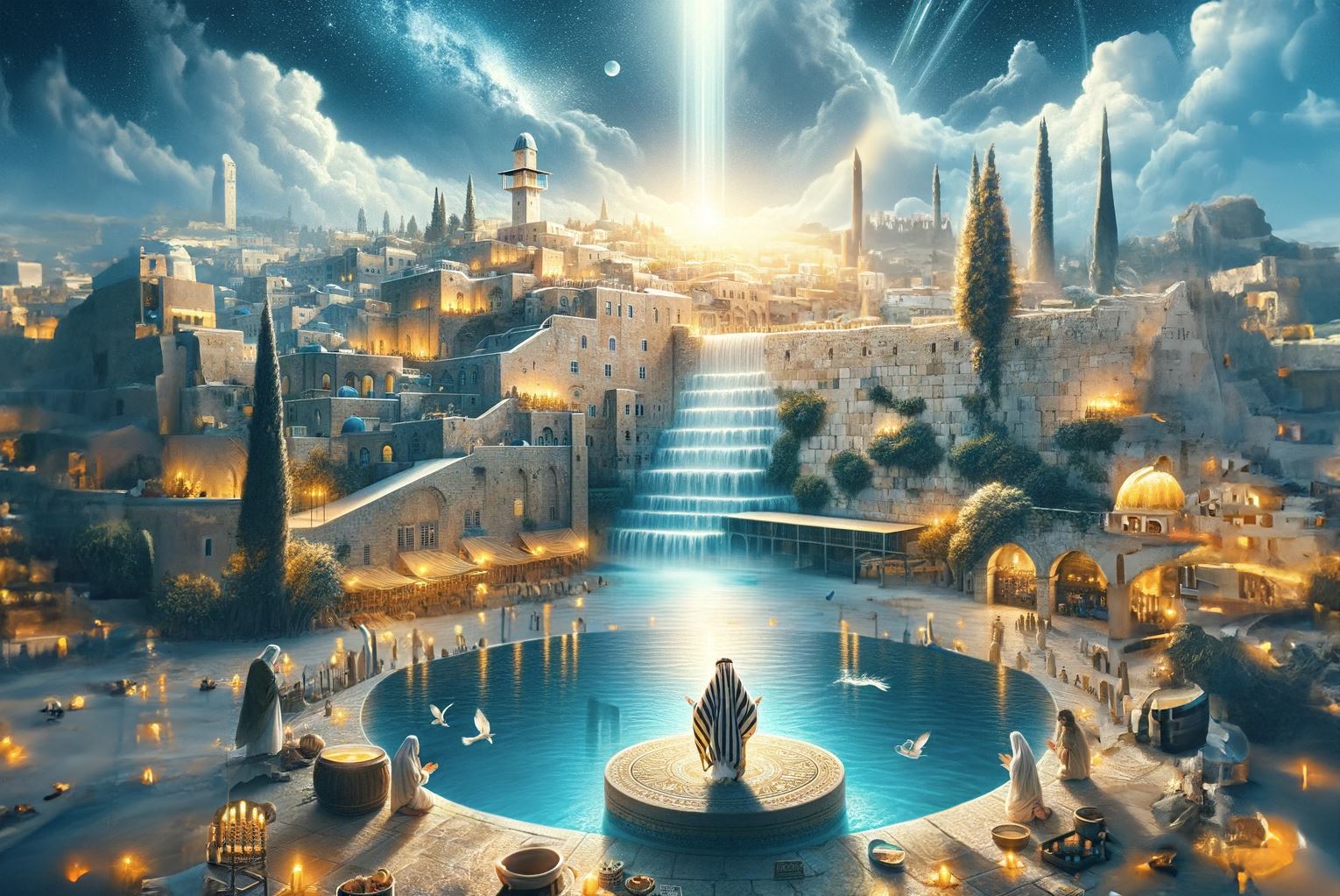
‘The cascading creative light of HaShem’, by AI / Gil Dekel. 2024.
However, if there is some sort of a higher wisdom/light, why would the ‘creator’ not simply implement it into our hearts? Why are we not born with such wisdom? Kabbalah explains that the wisdom is not automatically implemented into people’s minds in order to give people a chance to take a more active part in the creative process of life. Using the metaphor of the creation of the world, Kabbalah explains that the beauty of this creation is that it was not complete. We are tasked with completing it. The story of God creating the world in seven days is not the full story. In a way, the creation still continues. It has not been concluded, as there is something for us to add.
By taking an active part, people will assume authorship over their creations. If, on the other hand, people were provided with a golden plate with all possibilities available for them to choose from (any relationships, finances, education, house, cars, dreams) then people would enjoy their pick for a while but would then feel that they did not earn it and did not achieve it. If all desires and riches were handed down to people, there would come a time of dissatisfaction. People would feel unaccomplished. Therefore, if we put in some effort, and work on drawing down the wisdom/light then we will feel that we have earned it, deserve it, and that we have a part in it. In doing so, we will become co-creators and partners in Beresheet (Genesis).
This notion of humans’ intervention in the creation puts the person at the centre of creativity. It gives people meaning and purpose (Walsch, 2004: 150). No matter how small we may feel at times – we all have a big purpose to fulfil (Roberts, 1979: 11). With a sense of purpose, people usually become stronger, and more determined to overcome challenges (Maslow, 1994: 37). This is essential since any progress requires people to overcome challenges and to be brave enough to accept change.
Kabbalah explains that divine wisdom exists all around us in the physical realm, but is hidden. It is concealed, and we are supposed to find and reveal it. While life may not ‘tell’ us what truth is, it provides the conditions for us to find truth (Yeats, 197: 22). Destiny is what we make of it (‘Athlete’, 2023) – we have a part in it.
There is a ‘technical’ reason why the light is hidden: as God is creating something, that creation contains so much spiritual light that it is immediately absorbed back into God. The creation is too strong for us to comprehend; too high for us to grasp. Therefore, the creator conceals the light. This creates an illusion of separation, where the earth – and all in it – are seen to us as if independent. Everything is seen as if disconnected from their creator; as if things exist or are born out of their own accord. This illusion of separation is required for the created to operate in the physical realm. Without this illusion, people would not be able to perceive the creation because the light would be too bright.
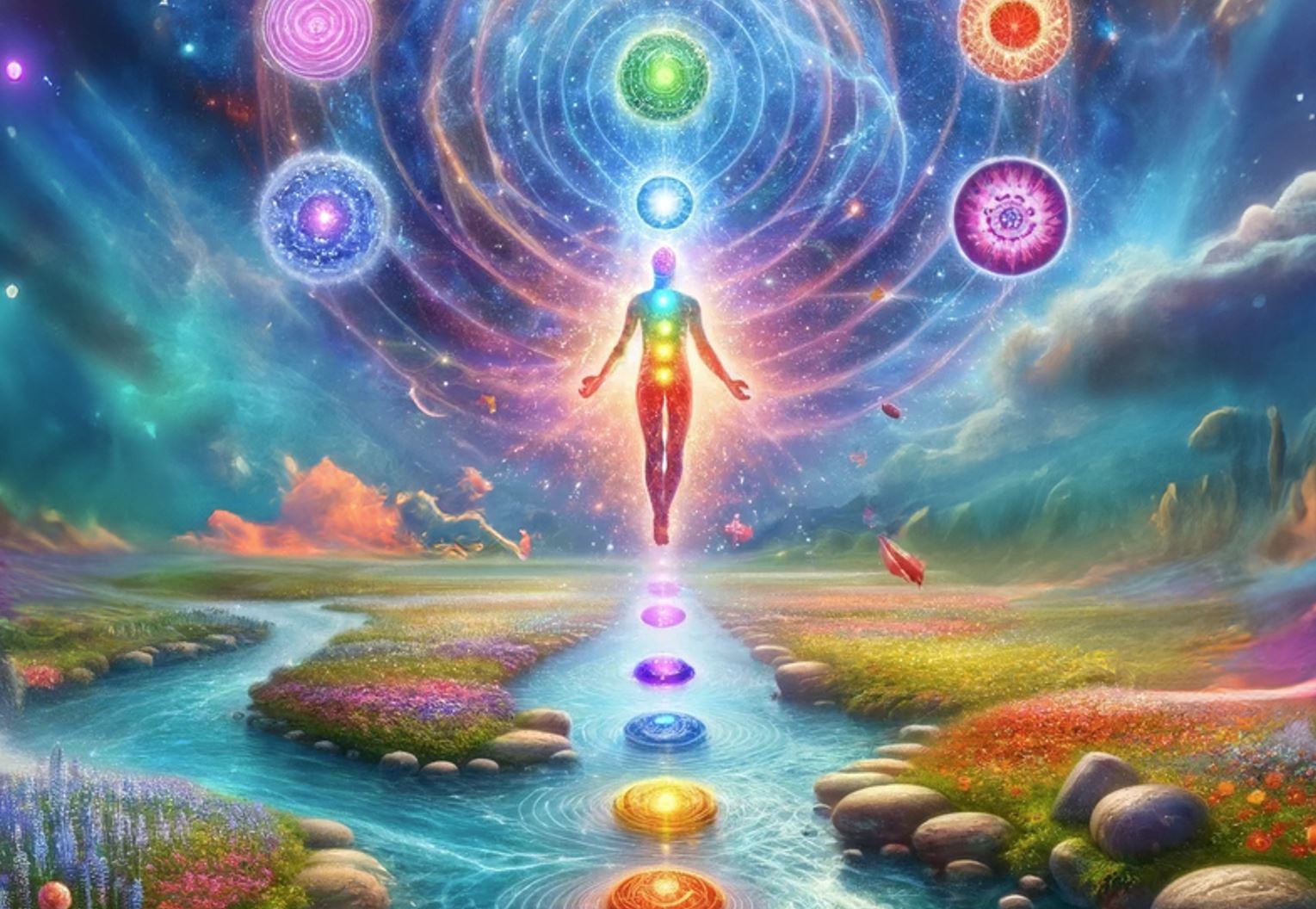
‘Divine Wisdom’, by AI / Gil Dekel. 2024.
One of the Jewish higher beings (‘angel’) illustrates this concept. The angel HashMal (חשמל) has such a yearning for God, that once created he is immediately drawn back into God. The light of God is too bright for the angel to hold so the angel recedes back, but then again is drawn to God in a never-ending cycle. ‘Hash’ (חש) means in Hebrew to move quickly forward, whereas ‘Mal’ means to draw back. HashMal means that which draws forwards and then back… HashMal is also the Hebrew word for electricity, as electricity is identified by its alternating current.
So, the creator is narrowing the light of the creation (in Hebrew: Tzimzum צימצום), making creation more condensed, more solid and dark, and therefore, physical. This physical, light-reduced creation is something people can see and interact with. The illusion of separation is necessary for us on earth to see and experience the creation on our physical level.
But, how can people reveal the light?
Judaism offers a list of deeds, actions (Mitzva; plural Mitzvot) to help bring down the light. The deeds can help all people (religious, or non-religious) to be more creative. Some of the deeds that the Torah lists are actions between one person and another person. The deeds simply outline how to behave correctly with each other. Other Mitzvot are designed to be between the individual person and directly with God. These deeds are useful in improving creativity, as they can raise human consciousness. To raise a person’s consciousness, they need to make a certain connection with the Godly light. According to Judaism, there is no separation or mediation between the person and God, rather all people have a direct link to God. The ultimate perfection is reached internally by the individual, through a personal inner-work, and not via the collective (Dekel, 2012: 721-722).
And so, some of the Mitzvot, the deeds, are designed to elevate you to feel closer to the Godly inspiration. The tool to do so is known as Bracha. Bracha means a blessing. People are asked to say blessings for the mundane things in life, such as to bless the water we drink, the food; even bless the morning since we are given a new day… The purpose of Bracha, blessing, is to raise our own consciousness. By blessing, we will appreciate the mundane, the simple things in life, and therefore we will start to see the beauty in them. In that beauty lives the light, the higher wisdom.
In Hebrew, the word Bracha (a blessing) sounds very similar to the word Brecha (pool of water). Bracha – a blessing; Brecha – pool of water. When you add the Hebrew letter yud to Bracha, it becomes Brecha. The letter yud is the first letter in the sacred name of God. So, when you say Bracha, a blessing, and you intend towards God (yud), you turn Bracha into a Brecha, a pool of water. We know that water seeks the lowest point, flowing from above down – and therefore the idea is that when you say a blessing and you intend for God, you are hoping that the light from above will flow down as water flowing down into a pool, a Brecha on earth. It’s about drawing down from a high place to a lower place. From Heaven to Earth.
Water is the source from which our planet was created, according to Judaism, and it existed even before our world. Water comes from a highly Godly realm. It contains spiritual knowledge. Accordingly, any water that you drink existed before you were born. Water in your kitchen tap, or in your water bottle, has been around before you did… It knows more, it has seen more, it has a lot to offer you. And so, before you drink, acknowledge and respect water, for its existence that preceded yours, for its knowledge, and for the simple fact that it is going to be part of your body when you drink it. Acknowledge, respect and bless it.
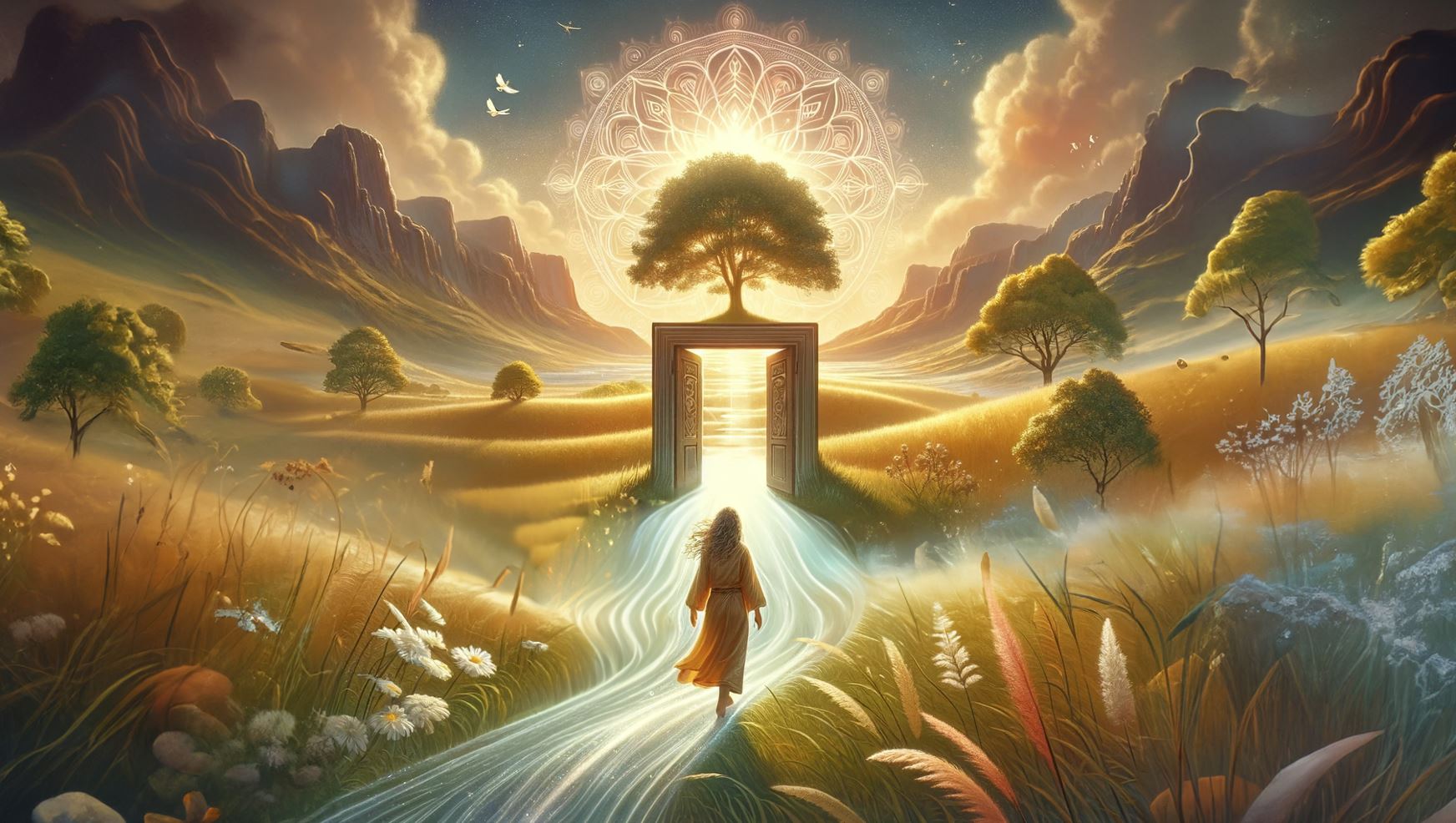
‘The Light Water of Bracha’, by AI / Gil Dekel. 2024.
In essence, God does not need us to bless anything, as God does not need anything at all from us. He does not require anything from people, as he has everything. He is self-contained. Bracha was designed to help people raise their awareness and evolve. Bracha is a tool to help and benefit people. People become more creative by learning to access their intuition (Sherwin, 2010: 3). Being aware of the creative power within, one feels insights that harmonise science and art (Steiner, 1972: 5). One step in this process is to start learning about ourselves – to learn how we think, and how we perceive and understand reality, instead of just learning what other people said or wrote about reality (Descartes, [1630-1701] 1972: 153). You can release long-cherished dramas inherited from generations. Focus on cutting cords with outdated beliefs, relationships, jobs, or habits that drain you. Move forward with intention and attention, free from the need for external validation or resources. Trust in your internal resources and stay focused on your intentions. Life will guide you if you allow it. Pay attention to the fine details of your life – the water you drink, the food you eat, the words you use, the thoughts you think. Small details hold the key to clarity and understanding.
So, in order to be creative, we need to pay attention and sense the beauty of this world, since the beauty contains a wisdom that can serve people well in becoming more inspired. The tool to see this beauty and inner wisdom is to simply understand ourselves and appreciate the mundane things in life. Life’s true essence is revealed in the details and through a genuine connection to the present moment. We can learn appreciation by raising our consciousness. Kabbalah suggests that the act of blessing can help raise awareness. This will open our eyes, and help us see more. We would then notice that which we usually ignore.
Appreciation of life is a useful and rather easy tool – it does not require big unachievable change, but rather only a simple act and a shift of mind. The process is not about fulfilling religious duty; rather it is about engaging with the world, finding and revealing the hidden sparks of its divine wisdom. It is about becoming a more creative species that is ready to embrace the new as it comes.
Key points:
- Beyond – There is more to the world than what we see.
- Ongoing creation – The world is not a finished product; rather it is ongoing.
- Active participation – People have a part to take, rather than passively receive.
- The illusion of separation – Concealment of divine light creates an illusion of independence in the physical realm, which is necessary for humans to be able to experience physical life.
- Revealing hidden light – Saying Bracha (blessings) elevates consciousness and helps appreciate the mundane, revealing life’s hidden beauty and wisdom.
At a glance
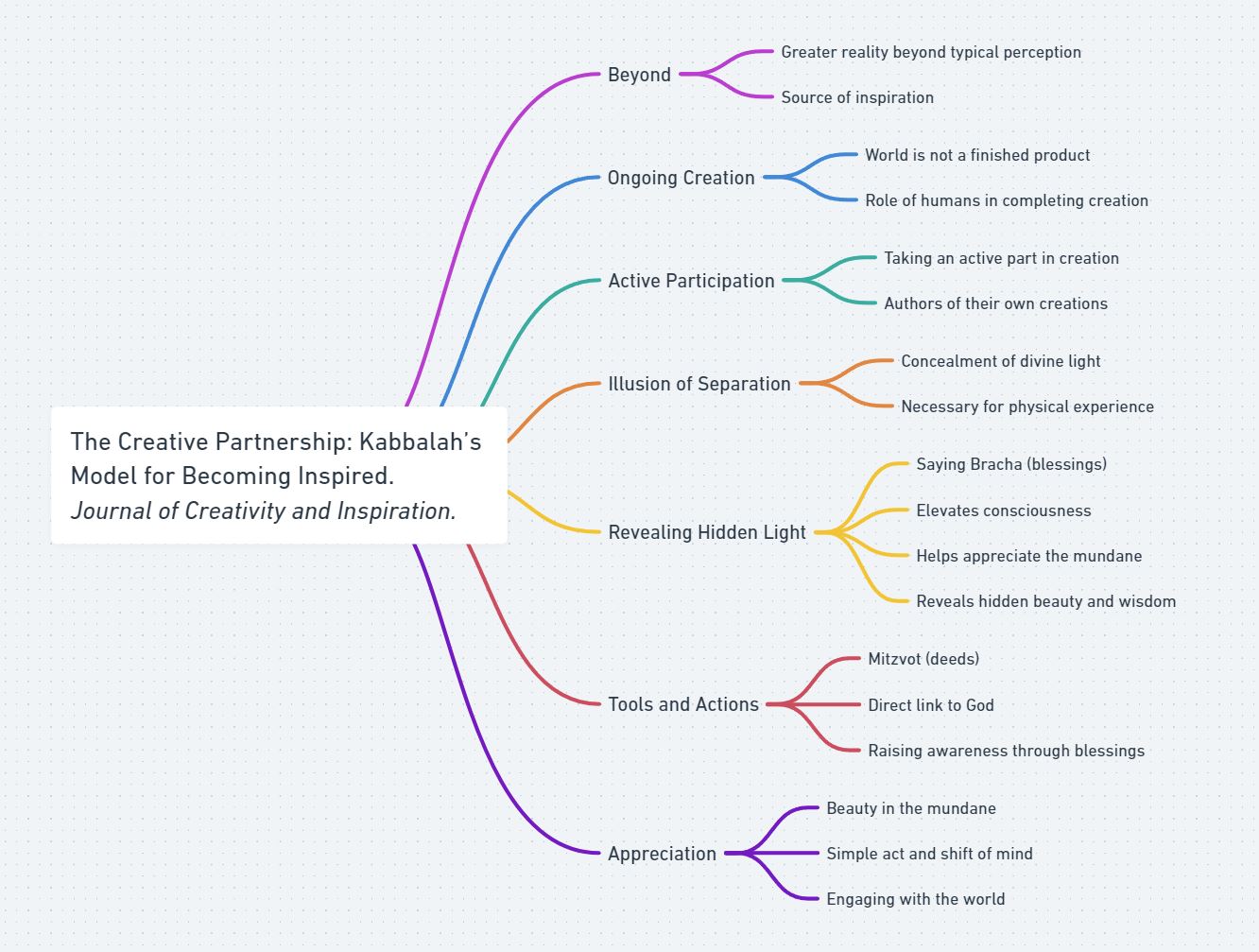
We wish to acknowledge the wisdom of Rambam (Maimonides) who came to us in a guided meditation, and helped with this article.
© Journal of Creativity and Inspiration.
Images by AI / Gil Dekel.
Gil Dekel is a doctor in Art, Design and Media, specializing in processes of creativity and inspiration. He is a lecturer, visionary artist, Reiki Master/Teacher, and co-author of the ‘Energy Book’. He was awarded the Queen Elizabeth II Platinum Jubilee Coin, in recognition of his dedication and commitment to pastoral work at Hampshire Constabulary.
References
‘Athlete’ (2023) Arnold, episode 1. Netflix. Accessed 8 and 9 June 2023, from: https://www.netflix.com/browse?jbv=81317673
Dekel, Gil. (2012) Conclusions from the book: ‘Conversations on the prophecy, selected chapters in Maimonides’ Guide for the Perplexed’ by Yeshayahu Leibowitz, Part 2. Accessed 24 June 2024, from: https://www.poeticmind.co.uk/sages/%D7%9E%D7%A1%D7%A7%D7%A0%D7%95%D7%AA-%D7%A9%D7%99%D7%97%D7%95%D7%AA-%D7%A2%D7%9C-%D7%AA%D7%95%D7%A8%D7%AA-%D7%94%D7%A0%D7%91%D7%95%D7%90%D7%94-%D7%A8%D7%9E%D7%91%D7%9D-%D7%99%D7%A9%D7%A2%D7%992/
Descartes, Rene. ([1630-1701] 1972) Philosophical Writings. London: Open University.
Jung, Carl. (1972) “Approaching the unconscious”. In Jung, C. (ed.) Man and his Symbols. London: Aldus Books.
Kant, Emmanuel. (2000) Critique of Pure Reason. Jerusalem: Bialik.
Maslow, Abraham. (1994) Religions, Values, and Peak-Experience. New York: Penguin.
Roberts, Jane. (1979) The Nature of the Psyche: Its Human Expression. New Jersey: Prentice – Hall Inc.
Sherwin, David. (2010) Creative Workshop – 80 Challenges to Sharpen your Design. Ohio: HOW Books.
Steiner, Rudolf. (1972) A Modern Art of Education. London: Rudolf Steiner Press.
Walsch, Neale Donald. (2004) Tomorrow’s God. London: Hodder & Stoughton.
Yeats, W. B. (1974) A Vision. London: Macmillan.
דקל, גיל. (2012) מסקנות מהספר: שיחות על תורת הנבואה, פרקים נבחרים במורה נבוכים של הרמב’ם – ישעיהו ליבוביץ, חלק 2. נדלה ביום 24 יוני 2024, מדף: https://www.poeticmind.co.uk/sages/%D7%9E%D7%A1%D7%A7%D7%A0%D7%95%D7%AA-%D7%A9%D7%99%D7%97%D7%95%D7%AA-%D7%A2%D7%9C-%D7%AA%D7%95%D7%A8%D7%AA-%D7%94%D7%A0%D7%91%D7%95%D7%90%D7%94-%D7%A8%D7%9E%D7%91%D7%9D-%D7%99%D7%A9%D7%A2%D7%992/
קאנט, עמנואל. (2000) ביקורת התבונה הטהורה. ירושלים: מוסד ביאליק.
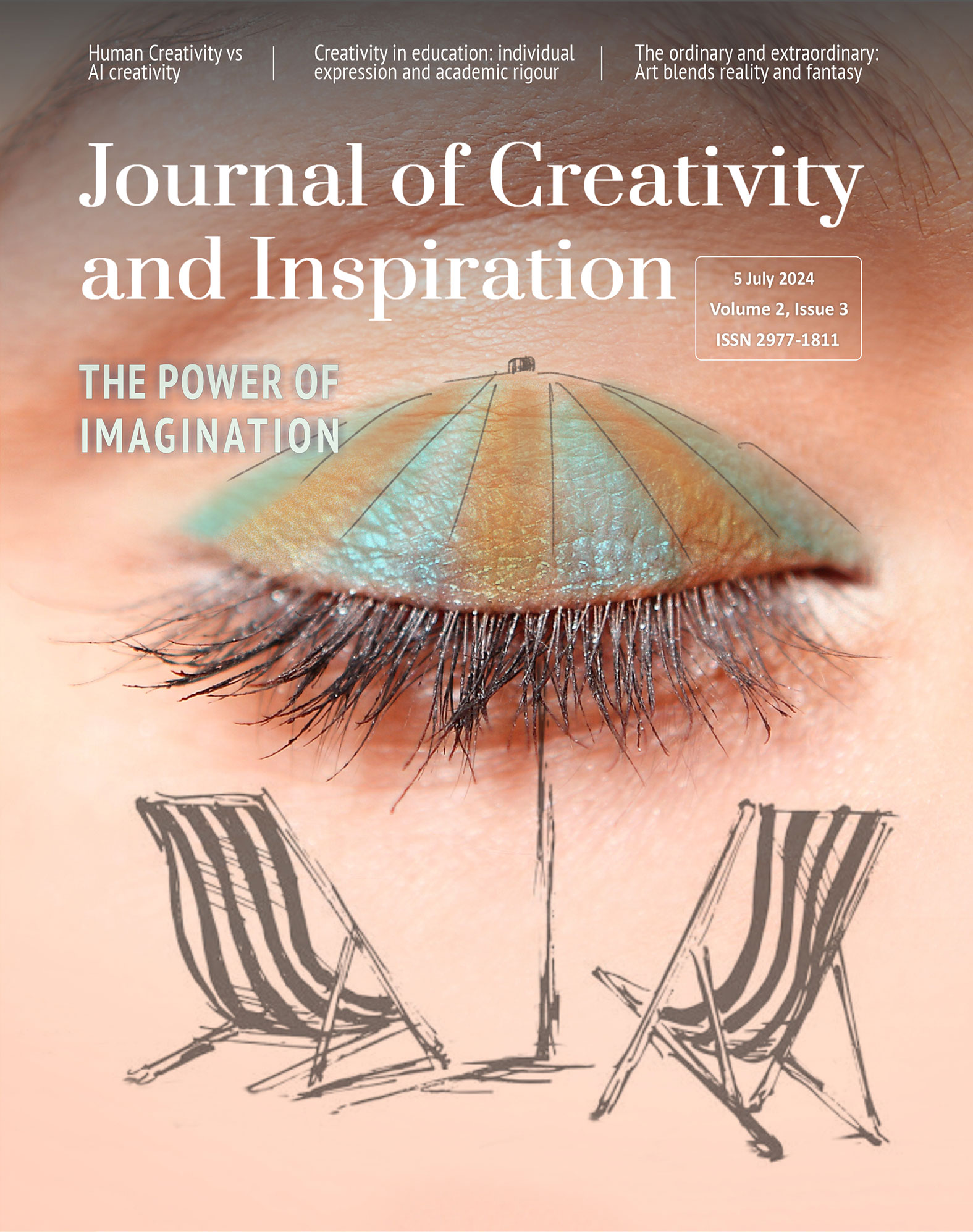
Gil,
I greatly enjoyed the way you chose to express the revelations in Kabbalah, which serve as a source of inspiration and light in our lives.
Beautiful!
Good luck!
Amikam